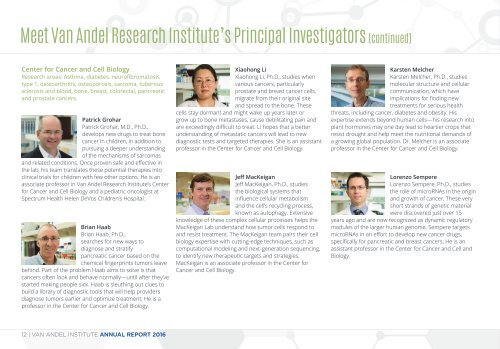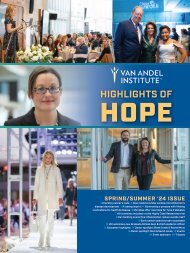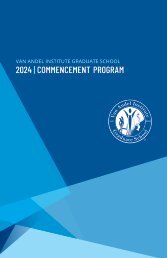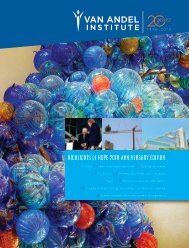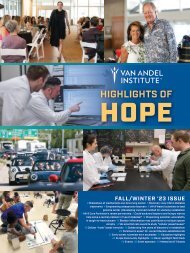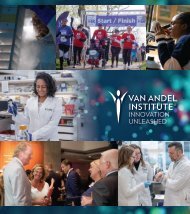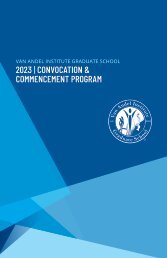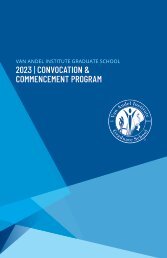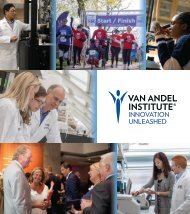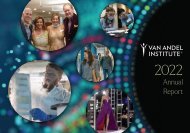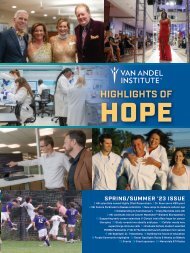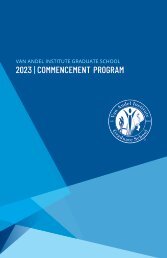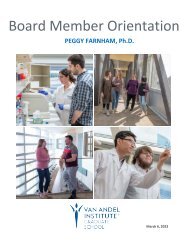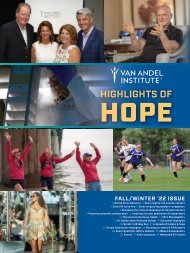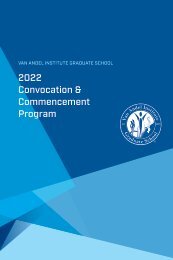2016 Annual Report
You also want an ePaper? Increase the reach of your titles
YUMPU automatically turns print PDFs into web optimized ePapers that Google loves.
Meet Van Andel Research Institute’s Principal Investigators (continued)<br />
Center for Cancer and Cell Biology<br />
Research areas: Asthma, diabetes, neurofibromatosis<br />
type 1, osteoarthritis, osteoporosis, sarcoma, tuberous<br />
sclerosis and blood, bone, breast, colorectal, pancreatic<br />
and prostate cancers.<br />
Patrick Grohar<br />
Patrick Grohar, M.D., Ph.D.,<br />
develops new drugs to treat bone<br />
cancer in children, in addition to<br />
pursuing a deeper understanding<br />
of the mechanisms of sarcomas<br />
and related conditions. Once proven safe and effective in<br />
the lab, his team translates these potential therapies into<br />
clinical trials for children with few other options. He is an<br />
associate professor in Van Andel Research Institute’s Center<br />
for Cancer and Cell Biology and a pediatric oncologist at<br />
Spectrum Health Helen DeVos Children’s Hospital.<br />
Brian Haab<br />
Brian Haab, Ph.D.,<br />
searches for new ways to<br />
diagnose and stratify<br />
pancreatic cancer based on the<br />
chemical fingerprints tumors leave<br />
behind. Part of the problem Haab aims to solve is that<br />
cancers often look and behave normally—until after they’ve<br />
started making people sick. Haab is sleuthing out clues to<br />
build a library of diagnostic tools that will help providers<br />
diagnose tumors earlier and optimize treatment. He is a<br />
professor in the Center for Cancer and Cell Biology.<br />
Xiaohong Li<br />
Xiaohong Li, Ph.D., studies when<br />
various cancers, particularly<br />
prostate and breast cancer cells,<br />
migrate from their original site<br />
and spread to the bone. These<br />
cells stay dormant and might wake up years later or<br />
grow up to bone metastases, cause debilitating pain and<br />
are exceedingly difficult to treat. Li hopes that a better<br />
understanding of metastatic cancers will lead to new<br />
diagnostic tests and targeted therapies. She is an assistant<br />
professor in the Center for Cancer and Cell Biology.<br />
Jeff MacKeigan<br />
Jeff MacKeigan, Ph.D., studies<br />
the biological systems that<br />
influence cellular metabolism<br />
and the cell’s recycling process,<br />
known as autophagy. Extensive<br />
knowledge of these complex cellular processes helps the<br />
MacKeigan Lab understand how tumor cells respond to<br />
and resist treatment. The MacKeigan team pairs their cell<br />
biology expertise with cutting-edge techniques, such as<br />
computational modeling and next-generation sequencing,<br />
to identify new therapeutic targets and strategies.<br />
MacKeigan is an associate professor in the Center for<br />
Cancer and Cell Biology.<br />
Karsten Melcher<br />
Karsten Melcher, Ph.D., studies<br />
molecular structure and cellular<br />
communication, which have<br />
implications for finding new<br />
treatments for serious health<br />
threats, including cancer, diabetes and obesity. His<br />
expertise extends beyond human cells—his research into<br />
plant hormones may one day lead to heartier crops that<br />
resist drought and help meet the nutritional demands of<br />
a growing global population. Dr. Melcher is an associate<br />
professor in the Center for Cancer and Cell Biology.<br />
Lorenzo Sempere<br />
Lorenzo Sempere, Ph.D., studies<br />
the role of microRNAs in the origin<br />
and growth of cancer. These very<br />
short strands of genetic material<br />
were discovered just over 15<br />
years ago and are now recognized as dynamic regulatory<br />
modules of the larger human genome. Sempere targets<br />
microRNAs in an effort to develop new cancer drugs,<br />
specifically for pancreatic and breast cancers. He is an<br />
assistant professor in the Center for Cancer and Cell and<br />
Biology.<br />
12 | VAN ANDEL INSTITUTE ANNUAL REPORT <strong>2016</strong>


